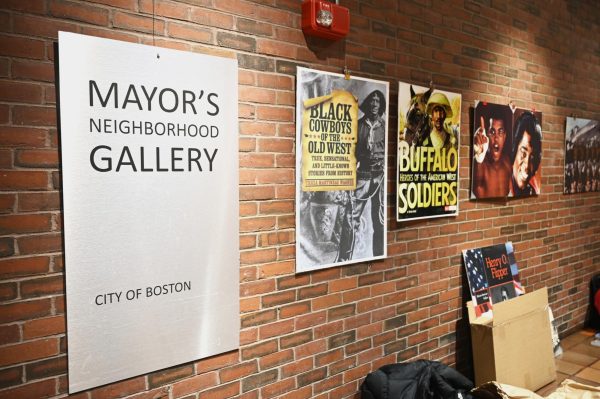When local lecturer and historian Muqueedah Salaam first attended college as a young adult at Worcester State University, she became disappointed by what she was, or rather, wasnãt taught. Education was her calling, she said, but she decided to leave school, learn, teach, and tutor others herself about American history she felt was being left out.ô
ãI didnãt feel that I was getting the necessary information to keep studying traditionally,ã she said.
Salaam, 71, had a career as an educator in schools across the country before coming to Boston a decade ago, where she began lecturing in libraries and community centers. She has lectured at Boston Public Library locations across the city, including Brighton, Hyde Park, Jamaica Plain, Grove Hall, and at a Town Hall in Billerica.ô
It was after one of Salaamãs lectures three years ago when Mayor Michelle Wuãs office asked Salaam to create a gallery of important, and oftentimes underrepresented, Black historical figures inside the Neighborhood Gallery in City Hall. The series is part of Salaamãs effort to teach African American history and integrate the stories of significant Black figures into Boston communities.
As part of Bostonãs Black History Month programming, the Department of Arts and Culture organized exhibitions in City Hallãs four galleries showcasing local Black artists and organizations with historical connections to the city.ô
Frederick Williams, Salaamãs co-publisher of the series and her husband, said that white people and traditional history taught in schools have often relegated Black history to its own category or left it out. The country only highlights Black history for a month out of the year, which is a lot to cram in, said Williams.
ã[White people] don’t teach African American history and we only have a month of it,ã said Williams. ãSo we do it all year round.ã
The point of the gallery, to Salaam, is to show people that ãAfrican American history crosses culture, languages, there are no barriers.ã This is also the content of her educational lectures.ô
ãWe correct history,ã said Williams as he hung up a poster of Claudette Colvin, a 15-year-old who refused her seat to a white woman some nine months before Rosa Parks. Colvin was unmarried and pregnant around the time of the incident and civil rights leaders opted to not publicise her activism.
Salaam and Williams, who are Roxbury residents, often give lectures on an array of Black history topics across the city at libraries and community spaces. The duo rotates postersô throughout the month to highlight as many stories and people as possible.
Williams said that while many people know Martin Luther King Jr., white-centered history wants people to forget the people before him, who without, ãhe couldnãt have done anything.ã
Williams used the example of Frederick Douglass, who was a strong advocate for allowing African Americans in the military during the Civil War and believed that the Union winning could end slavery, as Lincoln favored. He had a large part in the successful recruitment of the 54th and 55th Massachusetts Volunteer Infantry regiments and Black recruitment that made up over ten percent of the Union army.ô
ãThe brother right here talked to Lincoln personally,ã Williams said, pointing to a poster of Douglass. ãHe is probably responsible for emancipation. He is definitely responsible for us being in the war.ã
The gallery also includes posters of western horseback cattle herders in the 19th century. One in four cowboys of the time were Black, Williams said, pointing to a black and white photograph of a Buffalo soldier, a topic that Salaam has often lectured on.ô

The gallery also includes posters of figures with scientific, cultural, and financial significance. One poster features almost 80 Black inventors from decades past, what they invented, and the patent number of their contributions.
In the near future, Salaam said she hopes to start a partnership lecturing with the city’s Age Strong Commission, which focuses on enhancing the lives of the elderly.
Salaam and Williamãs exhibit will be housed on the second floor of City Hall until Feb. 21. The Scollay Square Gallery on the third floor currently houses a group show titled ãWho We Artã by the Haitian Artists Assembly of Massachusetts. Inside the Mayorãs Office Gallery on the fifth floor is a group show titled ãNo Going Back: Voices of the African Diasporaã by Northeastern Universityãs African American Master Artist-in-Residence Program (AAMARP).ô
The Cityãs Black History Month Celebration at City Hall will take place Wednesday, Feb. 19, at noon in Iannella Chamber on the fifth floor.